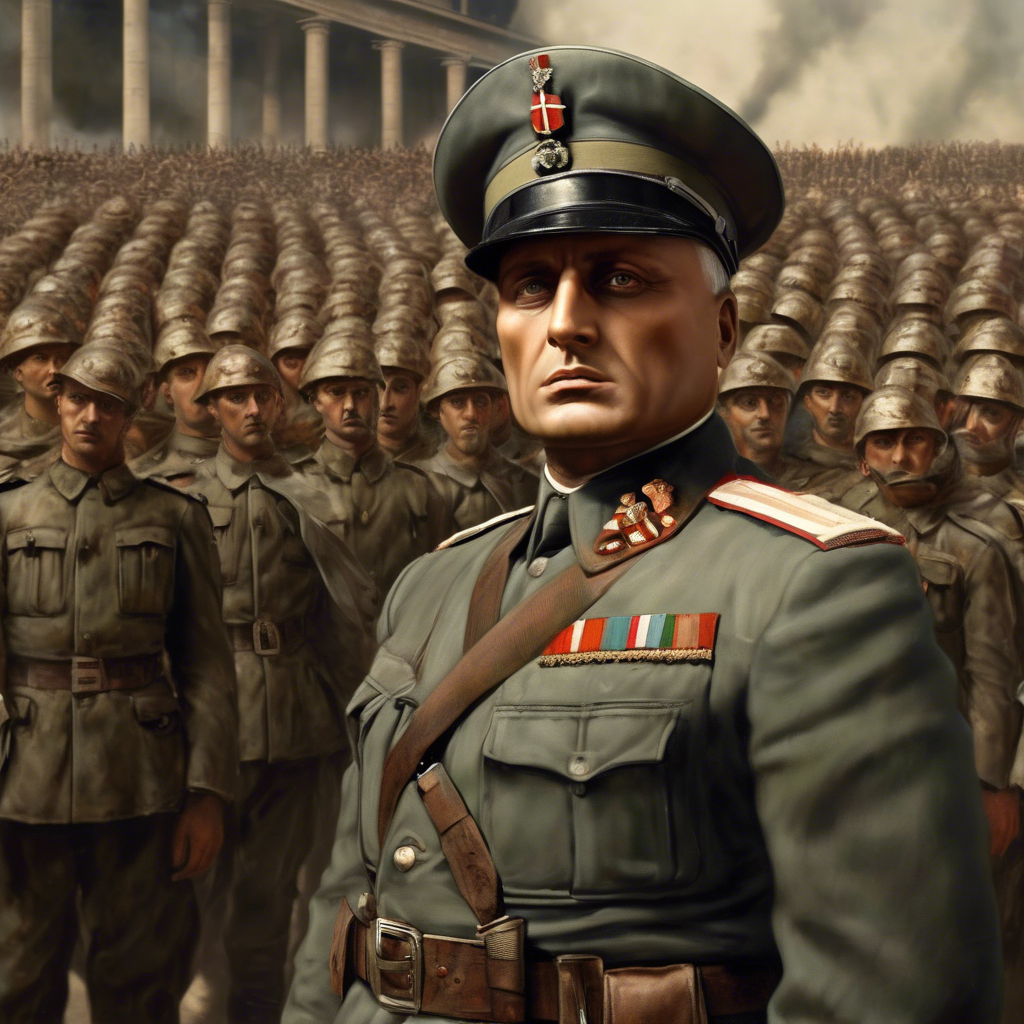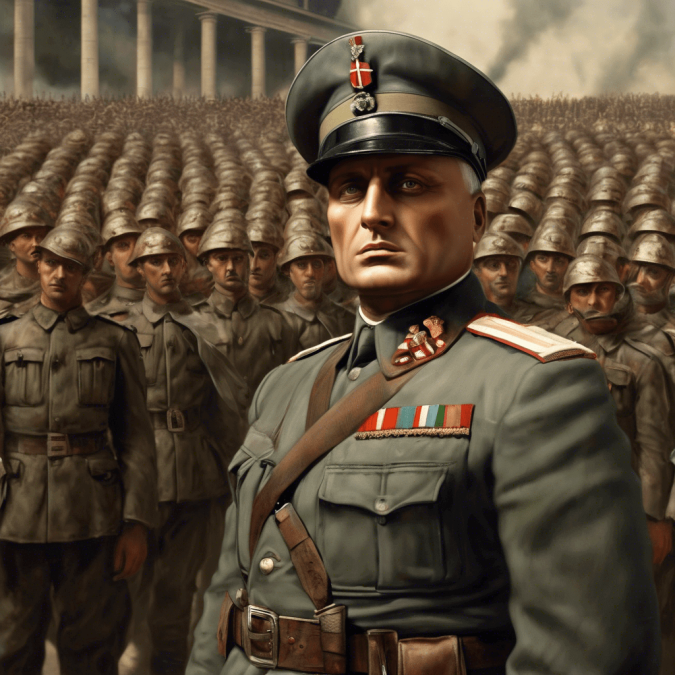
1. Introduction
Brief overview of the life of Benito Mussolini
Benito Mussolini, the founder of Italian Fascism and leader of Fascist Italy, was born on July 29, 1883, in Predappio, Italy. His controversial and tumultuous reign as Prime Minister and dictator left a lasting impact on Italian history and the course of World War II.
Importance of studying his biography
Studying the life of Benito Mussolini is essential for understanding the rise of fascism, authoritarianism, and totalitarianism in the 20th century. His political ideology, leadership style, and impact on Italian society and politics serve as a cautionary tale and a lesson in the dangers of unchecked power.
2. Early Life and Family Background
Birth and childhood
Benito Mussolini was born to Alessandro Mussolini and Rosa Maltoni in Predappio, a small town in northern Italy. His early years were marked by poverty, political turmoil, and a tumultuous family life, shaping his future ambitions and ideological convictions.
Family background and influences
The influence of Mussolini’s family, particularly his father’s socialist leanings and his mother’s devout Catholicism, instilled in him a complex set of beliefs that would later manifest in his political career. The family’s struggles and hardships left a lasting impact on Mussolini’s worldview.
Education and early career
Mussolini’s education was marked by academic mediocrity and a rebellious spirit. His early involvement in socialist politics and journalism laid the foundation for his future role as a revolutionary leader and agitator against the establishment.
3. Rise to Power
Involvement in socialist politics
Mussolini’s early political career was defined by his involvement in socialist and revolutionary movements in Italy. His fervent advocacy for workers’ rights, anti-war sentiments, and opposition to the ruling elite set him apart as a charismatic and controversial figure in Italian politics.
Creation of the Fascist Party
In 1919, Mussolini founded the Fascist Party, a nationalist and authoritarian movement that aimed to restore Italy’s former glory and combat the perceived threats of socialism and liberalism. The party’s paramilitary units, known as Blackshirts, became instrumental in enforcing Mussolini’s vision of a new Italy.
March on Rome and appointment as Prime Minister
The March on Rome in 1922, a mass demonstration of Fascist supporters and paramilitary forces, led to Mussolini’s appointment as Prime Minister by King Victor Emmanuel III. This marked the beginning of Mussolini’s dictatorial rule and the establishment of Fascist Italy.
4. Rule as Prime Minister and Leader of Fascist Italy
Domestic policies and reforms
Mussolini’s domestic policies aimed at centralizing power, suppressing dissent, and promoting a cult of personality around himself. The corporatist economic system, the suppression of political opposition, and the glorification of the state were key aspects of his rule.
Foreign policy and alliances
Mussolini’s foreign policy sought to expand Italy’s influence and territorial holdings, leading to military interventions in North Africa, Albania, and support for Francisco Franco during the Spanish Civil War. His alliance with Adolf Hitler and Nazi Germany further solidified Italy’s alignment with the Axis powers.
Relationship with Adolf Hitler and Nazi Germany
Mussolini’s alliance with Hitler and Nazi Germany was characterized by a complex dynamic of mutual admiration, rivalry, and dependence. The Rome-Berlin Axis and the Pact of Steel cemented their partnership, but Mussolini’s strategic blunders and military failures would ultimately strain their relationship.
5. World War II and Downfall
Italy’s involvement in World War II
Italy’s entry into World War II on the side of the Axis powers proved disastrous, with military defeats in North Africa, the Balkans, and the Mediterranean. The Italian campaign in Greece and the Eastern Front further exposed the weaknesses of Mussolini’s regime.
Military failures and loss of power
Mussolini’s military failures and the deteriorating situation on the Eastern Front led to his ousting as Prime Minister in 1943. The Allied invasion of Sicily and the fall of Fascist Italy signaled the beginning of the end for Mussolini’s regime.
Capture and execution
Mussolini’s capture by Italian partisans in 1945 and subsequent trial and execution marked the ignominious end of his rule. His body was displayed in Milan as a symbol of the defeat of fascism and the restoration of democracy in Italy.
6. Legacy and Impact
Analysis of Mussolini’s leadership style
Mussolini’s leadership style, characterized by charisma, authoritarianism, and propaganda, laid the groundwork for his totalitarian regime. His cult of personality, reliance on mass mobilization, and suppression of dissent mirrored the tactics of other dictators of his time.
Comparison with other dictators of his time
In comparison to other dictators of the 20th century, such as Hitler and Stalin, Mussolini’s regime was marked by a certain degree of pragmatism and opportunism. His willingness to adapt to changing circumstances and his erratic decision-making set him apart from his more ideologically driven counterparts.
Influence on Italian politics and society
Mussolini’s legacy continues to impact Italian politics and society, with the scars of fascism still visible in the collective memory of the nation. The legacy of Mussolini’s rule serves as a cautionary tale against the dangers of authoritarianism, nationalism, and the erosion of democratic institutions.
7. Conclusion
Summary of key points in Mussolini’s life
Benito Mussolini’s life, from his early years as a revolutionary socialist to his rise as the dictator of Fascist Italy and eventual downfall during World War II, is a testament to the complexities of power, ideology, and human ambition. His rule left a lasting impact on Italian history and the course of World War II.
Reflection on the lasting impact of his rule
The lasting impact of Mussolini’s rule, marked by authoritarianism, militarism, and nationalism, serves as a reminder of the dangers of unchecked power and the consequences of ideological extremism. His legacy challenges us to confront the dark chapters of history and strive towards a future free from the tyranny and oppression of the past.
8. References
– De Felice, Renzo. “Mussolini.” University of California Press, 2005.
– Gregor, A. James. “Mussolini’s Intellectuals – Mack Smith, Denis. “Mussolini.” Vintage Books, 1983.
– Bosworth, R. J. B. “Mussolini.” Arnold Publishers, 2002.
conclusion
the life and legacy of Benito Mussolini serve as a cautionary tale and a reminder of the dangers of authoritarianism, nationalism, and totalitarianism. His reign as Prime Minister of Fascist Italy left a profound impact on Italian society and politics, as well as the course of World War II. Studying his biography allows us to understand the complexities of power, ideology, and human nature, and serves as a warning against the erosion of democratic values and institutions.
By examining Mussolini’s early life, rise to power, rule as Prime Minister, involvement in World War II, and ultimate downfall, we gain insight into the dynamics of leadership, ideology, and the consequences of unchecked power. His legacy challenges us to remain vigilant against the forces of tyranny and oppression, and to uphold the principles of democracy, human rights, and social justice.
As we reflect on the life and impact of Benito Mussolini, may we remember the lessons of history and strive towards a future where the mistakes of the past are not repeated. His legacy, though dark and troubling, serves as a reminder of the resilience of democracy and the enduring power of the human spirit to overcome adversity and strive for a better world.
In the words of Mussolini himself, “It is better to live one day as a lion than 100 years as a sheep.” Let us heed this warning and ensure that the legacy of Benito Mussolini serves as a beacon of caution and enlightenment for generations to come.
